Business Law: Analysis of the UK Legal System and Employment Law
VerifiedAdded on 2023/06/12
|9
|2788
|212
Report
AI Summary
This report provides a comprehensive overview of the UK legal system with a focus on business law, including classifications of law, the roles of the High Court and Supreme Court, and sources of law such as case law and legislation. It explains the process of making legislation and delegated legislation in the UK. Furthermore, the report details UK employment law, specifically addressing the statutory duties of employers to their employees, and actions related to wrongful and unfair dismissal. The document concludes by emphasizing the crucial role of a well-functioning legal system in the growth and governance of a state.
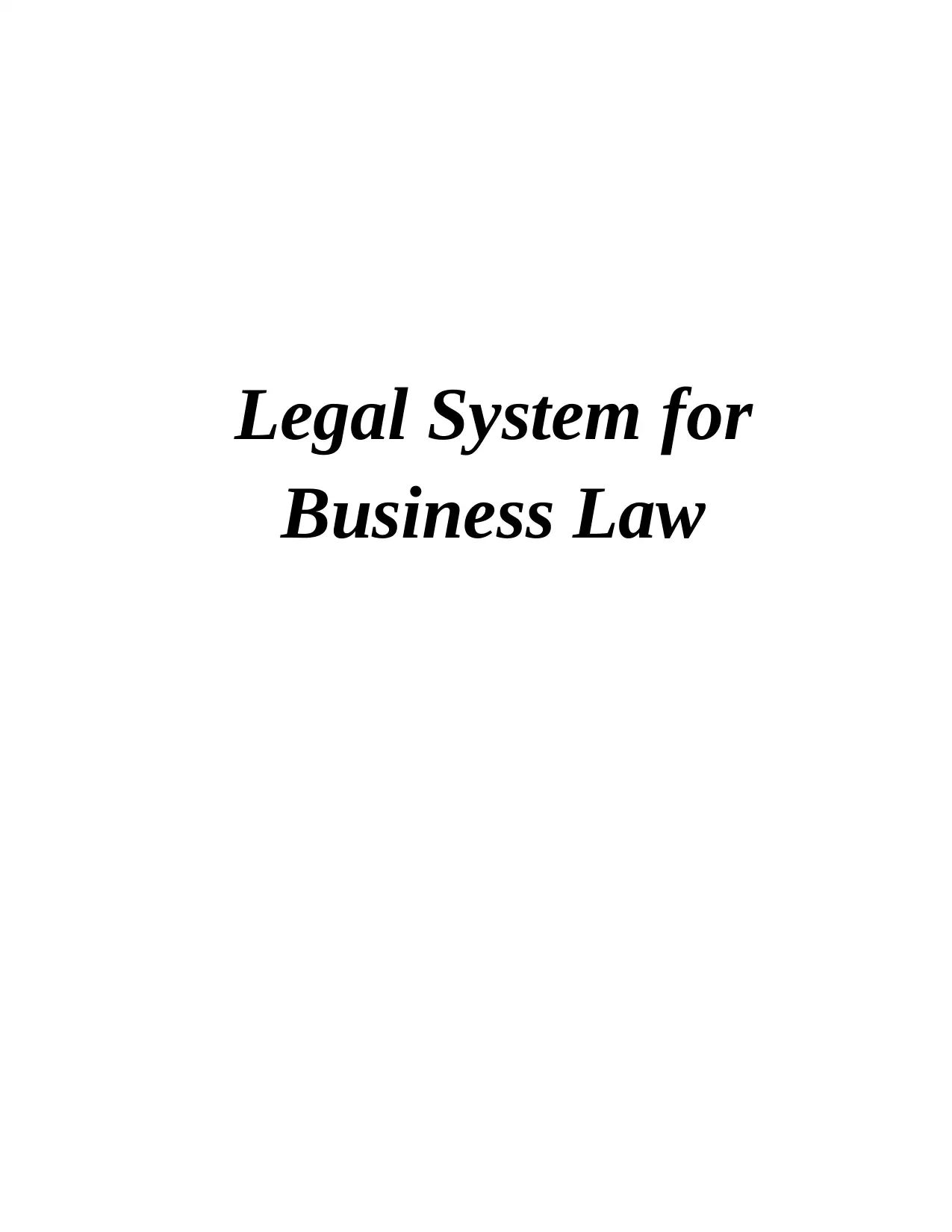
Legal System for
Business Law
Business Law
Paraphrase This Document
Need a fresh take? Get an instant paraphrase of this document with our AI Paraphraser
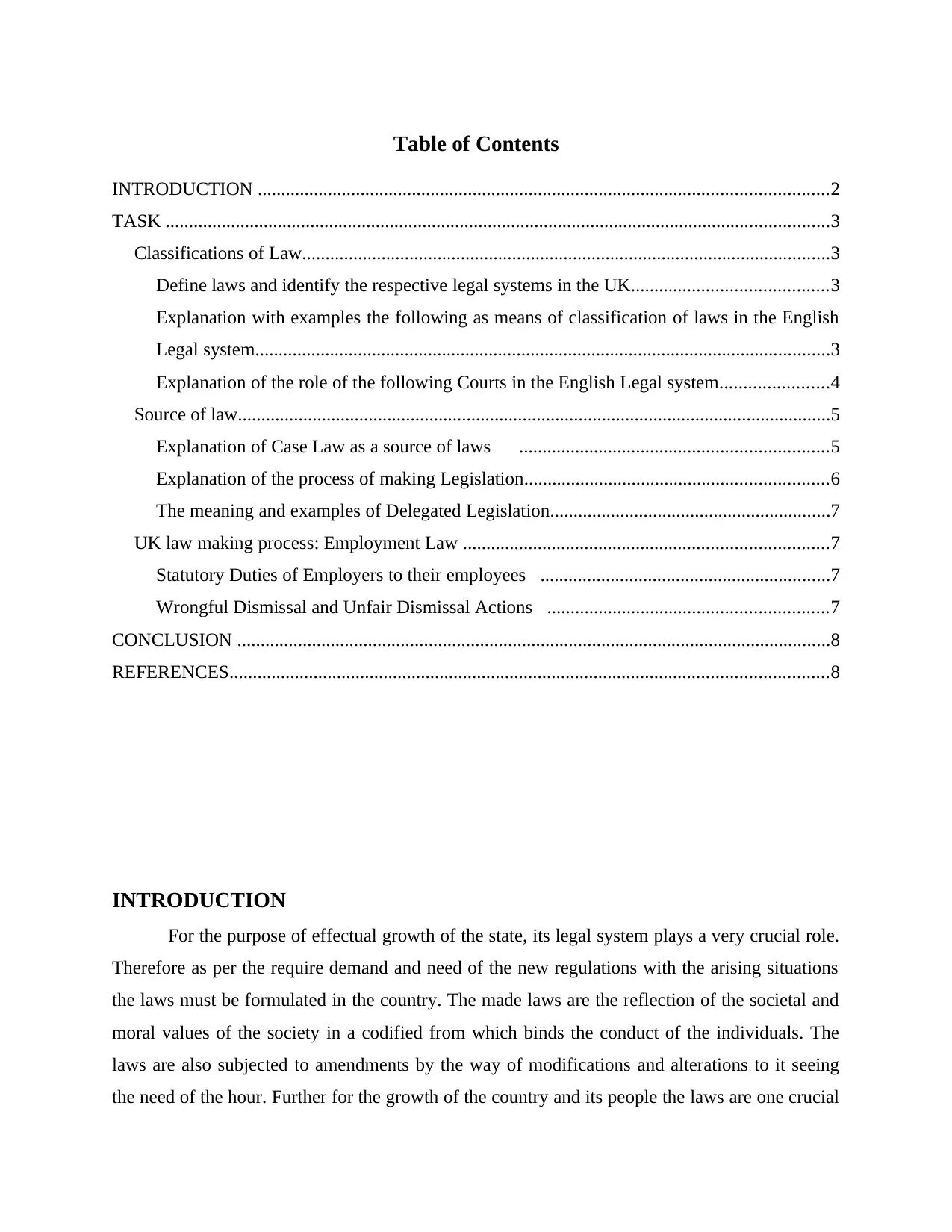
Table of Contents
INTRODUCTION ..........................................................................................................................2
TASK ..............................................................................................................................................3
Classifications of Law.................................................................................................................3
Define laws and identify the respective legal systems in the UK..........................................3
Explanation with examples the following as means of classification of laws in the English
Legal system...........................................................................................................................3
Explanation of the role of the following Courts in the English Legal system.......................4
Source of law...............................................................................................................................5
Explanation of Case Law as a source of laws ..................................................................5
Explanation of the process of making Legislation.................................................................6
The meaning and examples of Delegated Legislation............................................................7
UK law making process: Employment Law ..............................................................................7
Statutory Duties of Employers to their employees ..............................................................7
Wrongful Dismissal and Unfair Dismissal Actions ............................................................7
CONCLUSION ...............................................................................................................................8
REFERENCES................................................................................................................................8
INTRODUCTION
For the purpose of effectual growth of the state, its legal system plays a very crucial role.
Therefore as per the require demand and need of the new regulations with the arising situations
the laws must be formulated in the country. The made laws are the reflection of the societal and
moral values of the society in a codified from which binds the conduct of the individuals. The
laws are also subjected to amendments by the way of modifications and alterations to it seeing
the need of the hour. Further for the growth of the country and its people the laws are one crucial
INTRODUCTION ..........................................................................................................................2
TASK ..............................................................................................................................................3
Classifications of Law.................................................................................................................3
Define laws and identify the respective legal systems in the UK..........................................3
Explanation with examples the following as means of classification of laws in the English
Legal system...........................................................................................................................3
Explanation of the role of the following Courts in the English Legal system.......................4
Source of law...............................................................................................................................5
Explanation of Case Law as a source of laws ..................................................................5
Explanation of the process of making Legislation.................................................................6
The meaning and examples of Delegated Legislation............................................................7
UK law making process: Employment Law ..............................................................................7
Statutory Duties of Employers to their employees ..............................................................7
Wrongful Dismissal and Unfair Dismissal Actions ............................................................7
CONCLUSION ...............................................................................................................................8
REFERENCES................................................................................................................................8
INTRODUCTION
For the purpose of effectual growth of the state, its legal system plays a very crucial role.
Therefore as per the require demand and need of the new regulations with the arising situations
the laws must be formulated in the country. The made laws are the reflection of the societal and
moral values of the society in a codified from which binds the conduct of the individuals. The
laws are also subjected to amendments by the way of modifications and alterations to it seeing
the need of the hour. Further for the growth of the country and its people the laws are one crucial
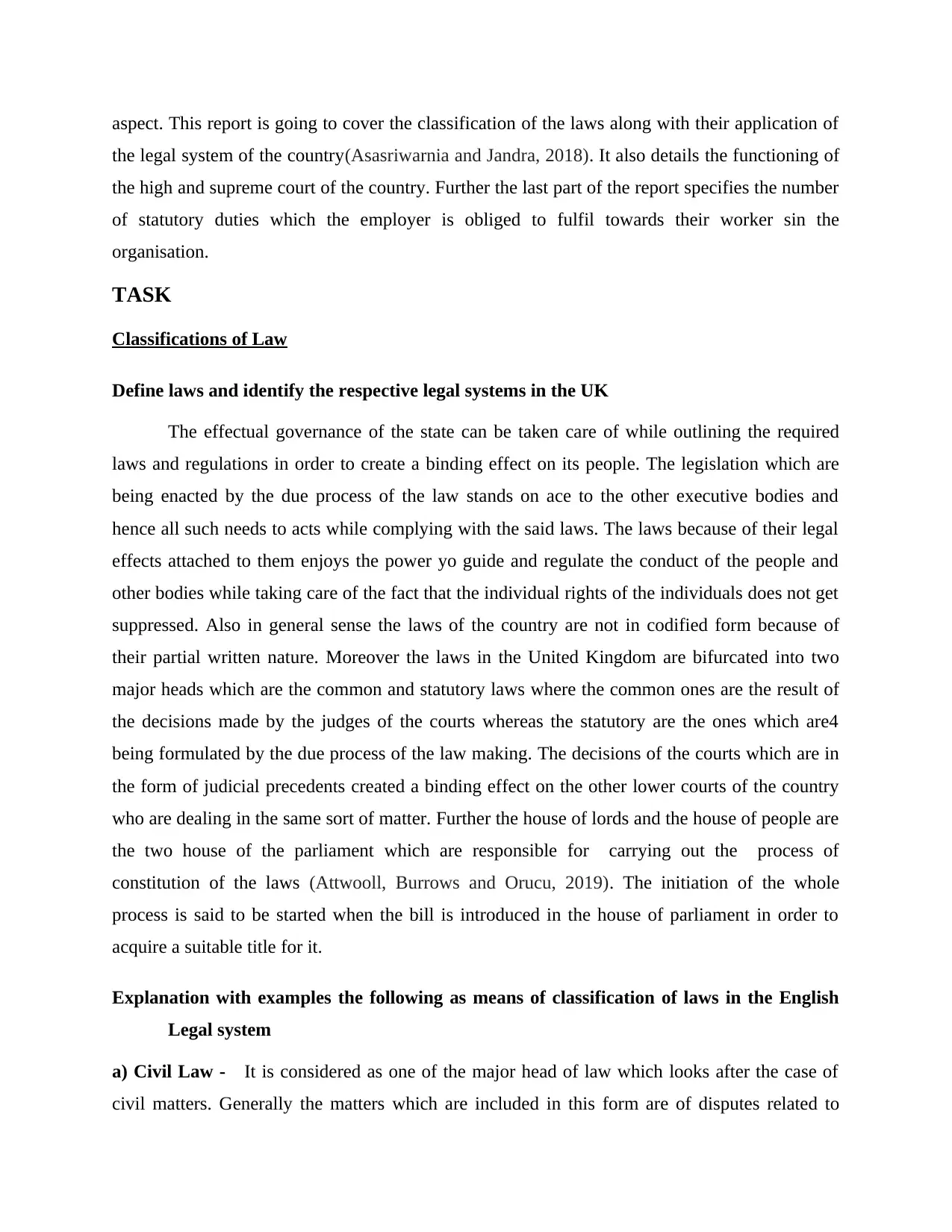
aspect. This report is going to cover the classification of the laws along with their application of
the legal system of the country(Asasriwarnia and Jandra, 2018). It also details the functioning of
the high and supreme court of the country. Further the last part of the report specifies the number
of statutory duties which the employer is obliged to fulfil towards their worker sin the
organisation.
TASK
Classifications of Law
Define laws and identify the respective legal systems in the UK
The effectual governance of the state can be taken care of while outlining the required
laws and regulations in order to create a binding effect on its people. The legislation which are
being enacted by the due process of the law stands on ace to the other executive bodies and
hence all such needs to acts while complying with the said laws. The laws because of their legal
effects attached to them enjoys the power yo guide and regulate the conduct of the people and
other bodies while taking care of the fact that the individual rights of the individuals does not get
suppressed. Also in general sense the laws of the country are not in codified form because of
their partial written nature. Moreover the laws in the United Kingdom are bifurcated into two
major heads which are the common and statutory laws where the common ones are the result of
the decisions made by the judges of the courts whereas the statutory are the ones which are4
being formulated by the due process of the law making. The decisions of the courts which are in
the form of judicial precedents created a binding effect on the other lower courts of the country
who are dealing in the same sort of matter. Further the house of lords and the house of people are
the two house of the parliament which are responsible for carrying out the process of
constitution of the laws (Attwooll, Burrows and Orucu, 2019). The initiation of the whole
process is said to be started when the bill is introduced in the house of parliament in order to
acquire a suitable title for it.
Explanation with examples the following as means of classification of laws in the English
Legal system
a) Civil Law - It is considered as one of the major head of law which looks after the case of
civil matters. Generally the matters which are included in this form are of disputes related to
the legal system of the country(Asasriwarnia and Jandra, 2018). It also details the functioning of
the high and supreme court of the country. Further the last part of the report specifies the number
of statutory duties which the employer is obliged to fulfil towards their worker sin the
organisation.
TASK
Classifications of Law
Define laws and identify the respective legal systems in the UK
The effectual governance of the state can be taken care of while outlining the required
laws and regulations in order to create a binding effect on its people. The legislation which are
being enacted by the due process of the law stands on ace to the other executive bodies and
hence all such needs to acts while complying with the said laws. The laws because of their legal
effects attached to them enjoys the power yo guide and regulate the conduct of the people and
other bodies while taking care of the fact that the individual rights of the individuals does not get
suppressed. Also in general sense the laws of the country are not in codified form because of
their partial written nature. Moreover the laws in the United Kingdom are bifurcated into two
major heads which are the common and statutory laws where the common ones are the result of
the decisions made by the judges of the courts whereas the statutory are the ones which are4
being formulated by the due process of the law making. The decisions of the courts which are in
the form of judicial precedents created a binding effect on the other lower courts of the country
who are dealing in the same sort of matter. Further the house of lords and the house of people are
the two house of the parliament which are responsible for carrying out the process of
constitution of the laws (Attwooll, Burrows and Orucu, 2019). The initiation of the whole
process is said to be started when the bill is introduced in the house of parliament in order to
acquire a suitable title for it.
Explanation with examples the following as means of classification of laws in the English
Legal system
a) Civil Law - It is considered as one of the major head of law which looks after the case of
civil matters. Generally the matters which are included in this form are of disputes related to
⊘ This is a preview!⊘
Do you want full access?
Subscribe today to unlock all pages.

Trusted by 1+ million students worldwide
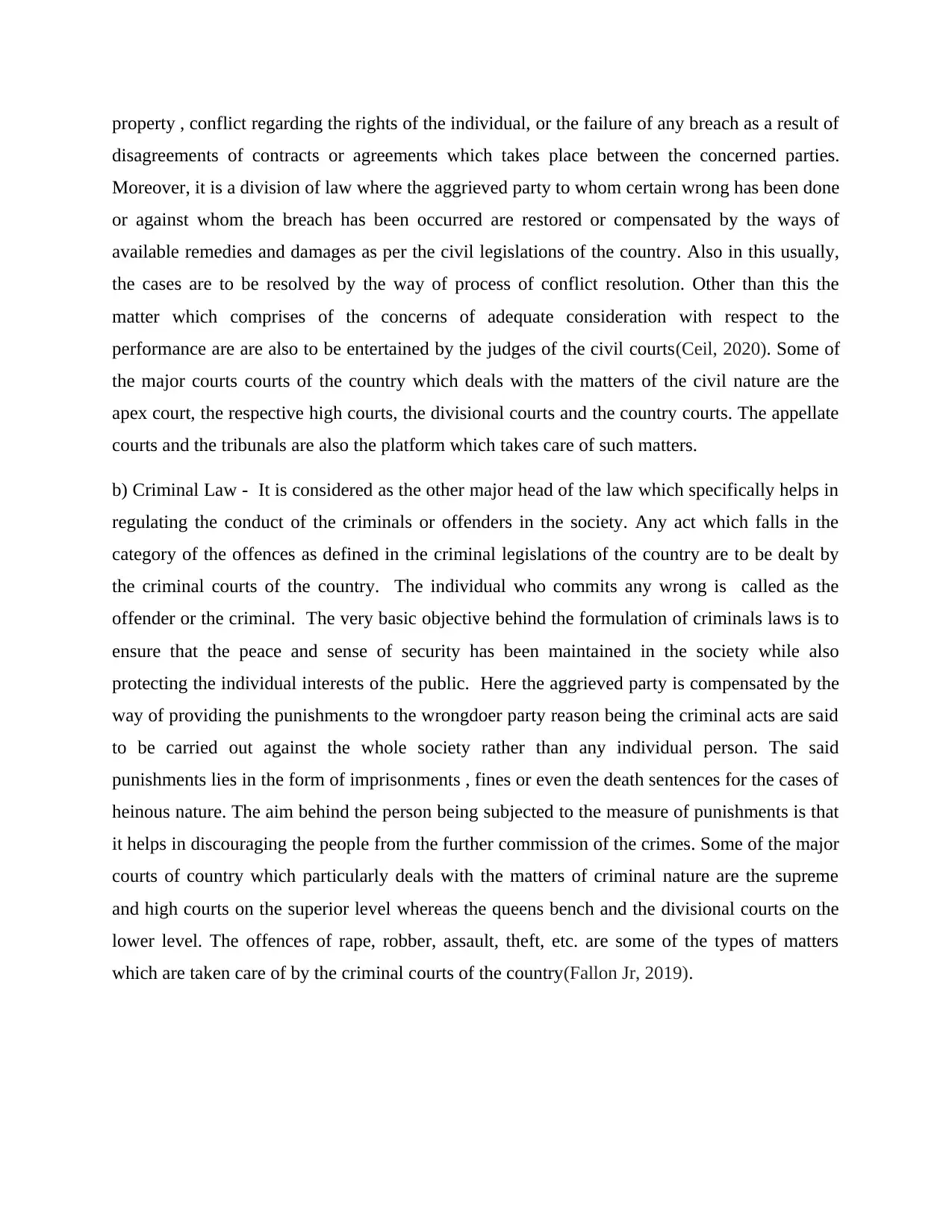
property , conflict regarding the rights of the individual, or the failure of any breach as a result of
disagreements of contracts or agreements which takes place between the concerned parties.
Moreover, it is a division of law where the aggrieved party to whom certain wrong has been done
or against whom the breach has been occurred are restored or compensated by the ways of
available remedies and damages as per the civil legislations of the country. Also in this usually,
the cases are to be resolved by the way of process of conflict resolution. Other than this the
matter which comprises of the concerns of adequate consideration with respect to the
performance are are also to be entertained by the judges of the civil courts(Ceil, 2020). Some of
the major courts courts of the country which deals with the matters of the civil nature are the
apex court, the respective high courts, the divisional courts and the country courts. The appellate
courts and the tribunals are also the platform which takes care of such matters.
b) Criminal Law - It is considered as the other major head of the law which specifically helps in
regulating the conduct of the criminals or offenders in the society. Any act which falls in the
category of the offences as defined in the criminal legislations of the country are to be dealt by
the criminal courts of the country. The individual who commits any wrong is called as the
offender or the criminal. The very basic objective behind the formulation of criminals laws is to
ensure that the peace and sense of security has been maintained in the society while also
protecting the individual interests of the public. Here the aggrieved party is compensated by the
way of providing the punishments to the wrongdoer party reason being the criminal acts are said
to be carried out against the whole society rather than any individual person. The said
punishments lies in the form of imprisonments , fines or even the death sentences for the cases of
heinous nature. The aim behind the person being subjected to the measure of punishments is that
it helps in discouraging the people from the further commission of the crimes. Some of the major
courts of country which particularly deals with the matters of criminal nature are the supreme
and high courts on the superior level whereas the queens bench and the divisional courts on the
lower level. The offences of rape, robber, assault, theft, etc. are some of the types of matters
which are taken care of by the criminal courts of the country(Fallon Jr, 2019).
disagreements of contracts or agreements which takes place between the concerned parties.
Moreover, it is a division of law where the aggrieved party to whom certain wrong has been done
or against whom the breach has been occurred are restored or compensated by the ways of
available remedies and damages as per the civil legislations of the country. Also in this usually,
the cases are to be resolved by the way of process of conflict resolution. Other than this the
matter which comprises of the concerns of adequate consideration with respect to the
performance are are also to be entertained by the judges of the civil courts(Ceil, 2020). Some of
the major courts courts of the country which deals with the matters of the civil nature are the
apex court, the respective high courts, the divisional courts and the country courts. The appellate
courts and the tribunals are also the platform which takes care of such matters.
b) Criminal Law - It is considered as the other major head of the law which specifically helps in
regulating the conduct of the criminals or offenders in the society. Any act which falls in the
category of the offences as defined in the criminal legislations of the country are to be dealt by
the criminal courts of the country. The individual who commits any wrong is called as the
offender or the criminal. The very basic objective behind the formulation of criminals laws is to
ensure that the peace and sense of security has been maintained in the society while also
protecting the individual interests of the public. Here the aggrieved party is compensated by the
way of providing the punishments to the wrongdoer party reason being the criminal acts are said
to be carried out against the whole society rather than any individual person. The said
punishments lies in the form of imprisonments , fines or even the death sentences for the cases of
heinous nature. The aim behind the person being subjected to the measure of punishments is that
it helps in discouraging the people from the further commission of the crimes. Some of the major
courts of country which particularly deals with the matters of criminal nature are the supreme
and high courts on the superior level whereas the queens bench and the divisional courts on the
lower level. The offences of rape, robber, assault, theft, etc. are some of the types of matters
which are taken care of by the criminal courts of the country(Fallon Jr, 2019).
Paraphrase This Document
Need a fresh take? Get an instant paraphrase of this document with our AI Paraphraser
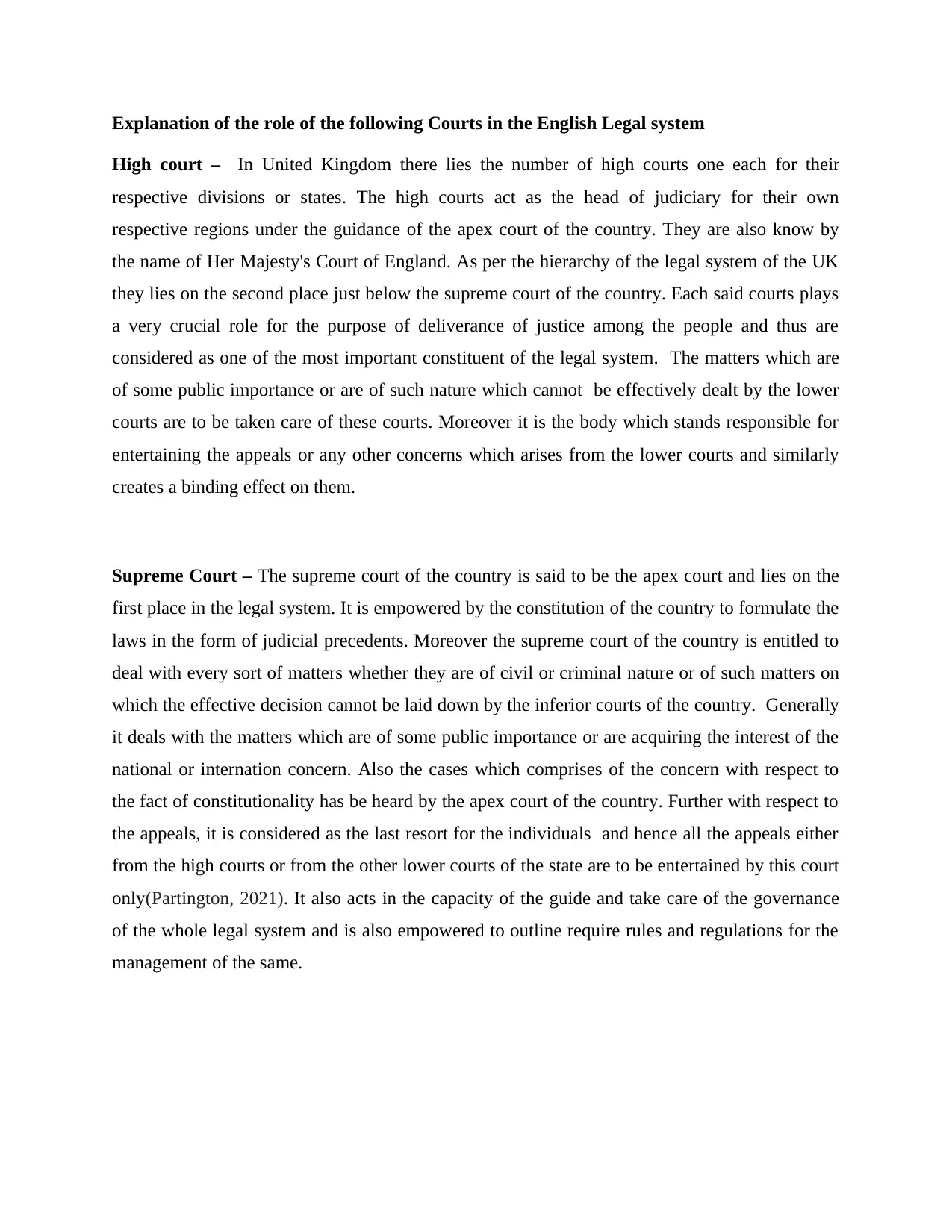
Explanation of the role of the following Courts in the English Legal system
High court – In United Kingdom there lies the number of high courts one each for their
respective divisions or states. The high courts act as the head of judiciary for their own
respective regions under the guidance of the apex court of the country. They are also know by
the name of Her Majesty's Court of England. As per the hierarchy of the legal system of the UK
they lies on the second place just below the supreme court of the country. Each said courts plays
a very crucial role for the purpose of deliverance of justice among the people and thus are
considered as one of the most important constituent of the legal system. The matters which are
of some public importance or are of such nature which cannot be effectively dealt by the lower
courts are to be taken care of these courts. Moreover it is the body which stands responsible for
entertaining the appeals or any other concerns which arises from the lower courts and similarly
creates a binding effect on them.
Supreme Court – The supreme court of the country is said to be the apex court and lies on the
first place in the legal system. It is empowered by the constitution of the country to formulate the
laws in the form of judicial precedents. Moreover the supreme court of the country is entitled to
deal with every sort of matters whether they are of civil or criminal nature or of such matters on
which the effective decision cannot be laid down by the inferior courts of the country. Generally
it deals with the matters which are of some public importance or are acquiring the interest of the
national or internation concern. Also the cases which comprises of the concern with respect to
the fact of constitutionality has be heard by the apex court of the country. Further with respect to
the appeals, it is considered as the last resort for the individuals and hence all the appeals either
from the high courts or from the other lower courts of the state are to be entertained by this court
only(Partington, 2021). It also acts in the capacity of the guide and take care of the governance
of the whole legal system and is also empowered to outline require rules and regulations for the
management of the same.
High court – In United Kingdom there lies the number of high courts one each for their
respective divisions or states. The high courts act as the head of judiciary for their own
respective regions under the guidance of the apex court of the country. They are also know by
the name of Her Majesty's Court of England. As per the hierarchy of the legal system of the UK
they lies on the second place just below the supreme court of the country. Each said courts plays
a very crucial role for the purpose of deliverance of justice among the people and thus are
considered as one of the most important constituent of the legal system. The matters which are
of some public importance or are of such nature which cannot be effectively dealt by the lower
courts are to be taken care of these courts. Moreover it is the body which stands responsible for
entertaining the appeals or any other concerns which arises from the lower courts and similarly
creates a binding effect on them.
Supreme Court – The supreme court of the country is said to be the apex court and lies on the
first place in the legal system. It is empowered by the constitution of the country to formulate the
laws in the form of judicial precedents. Moreover the supreme court of the country is entitled to
deal with every sort of matters whether they are of civil or criminal nature or of such matters on
which the effective decision cannot be laid down by the inferior courts of the country. Generally
it deals with the matters which are of some public importance or are acquiring the interest of the
national or internation concern. Also the cases which comprises of the concern with respect to
the fact of constitutionality has be heard by the apex court of the country. Further with respect to
the appeals, it is considered as the last resort for the individuals and hence all the appeals either
from the high courts or from the other lower courts of the state are to be entertained by this court
only(Partington, 2021). It also acts in the capacity of the guide and take care of the governance
of the whole legal system and is also empowered to outline require rules and regulations for the
management of the same.
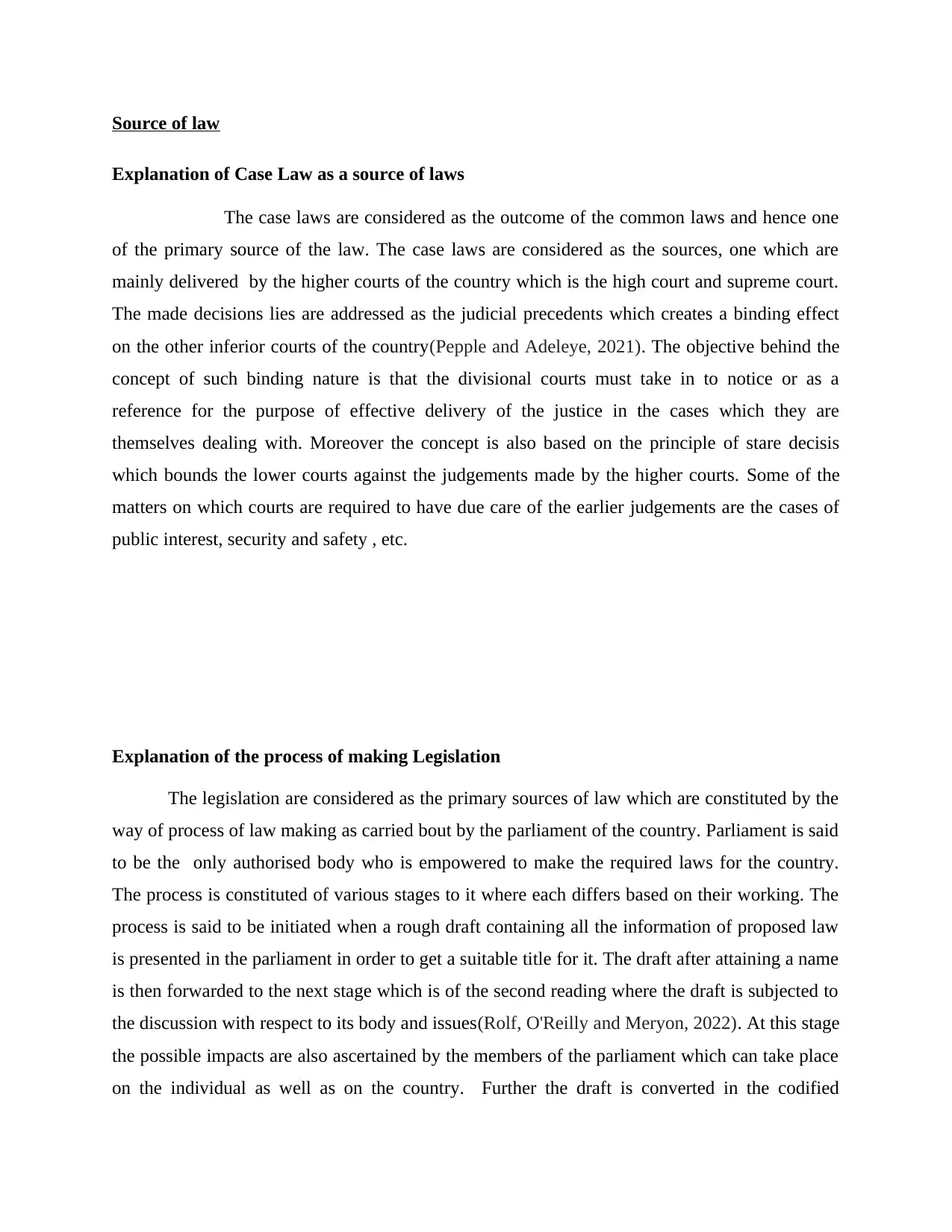
Source of law
Explanation of Case Law as a source of laws
The case laws are considered as the outcome of the common laws and hence one
of the primary source of the law. The case laws are considered as the sources, one which are
mainly delivered by the higher courts of the country which is the high court and supreme court.
The made decisions lies are addressed as the judicial precedents which creates a binding effect
on the other inferior courts of the country(Pepple and Adeleye, 2021). The objective behind the
concept of such binding nature is that the divisional courts must take in to notice or as a
reference for the purpose of effective delivery of the justice in the cases which they are
themselves dealing with. Moreover the concept is also based on the principle of stare decisis
which bounds the lower courts against the judgements made by the higher courts. Some of the
matters on which courts are required to have due care of the earlier judgements are the cases of
public interest, security and safety , etc.
Explanation of the process of making Legislation
The legislation are considered as the primary sources of law which are constituted by the
way of process of law making as carried bout by the parliament of the country. Parliament is said
to be the only authorised body who is empowered to make the required laws for the country.
The process is constituted of various stages to it where each differs based on their working. The
process is said to be initiated when a rough draft containing all the information of proposed law
is presented in the parliament in order to get a suitable title for it. The draft after attaining a name
is then forwarded to the next stage which is of the second reading where the draft is subjected to
the discussion with respect to its body and issues(Rolf, O'Reilly and Meryon, 2022). At this stage
the possible impacts are also ascertained by the members of the parliament which can take place
on the individual as well as on the country. Further the draft is converted in the codified
Explanation of Case Law as a source of laws
The case laws are considered as the outcome of the common laws and hence one
of the primary source of the law. The case laws are considered as the sources, one which are
mainly delivered by the higher courts of the country which is the high court and supreme court.
The made decisions lies are addressed as the judicial precedents which creates a binding effect
on the other inferior courts of the country(Pepple and Adeleye, 2021). The objective behind the
concept of such binding nature is that the divisional courts must take in to notice or as a
reference for the purpose of effective delivery of the justice in the cases which they are
themselves dealing with. Moreover the concept is also based on the principle of stare decisis
which bounds the lower courts against the judgements made by the higher courts. Some of the
matters on which courts are required to have due care of the earlier judgements are the cases of
public interest, security and safety , etc.
Explanation of the process of making Legislation
The legislation are considered as the primary sources of law which are constituted by the
way of process of law making as carried bout by the parliament of the country. Parliament is said
to be the only authorised body who is empowered to make the required laws for the country.
The process is constituted of various stages to it where each differs based on their working. The
process is said to be initiated when a rough draft containing all the information of proposed law
is presented in the parliament in order to get a suitable title for it. The draft after attaining a name
is then forwarded to the next stage which is of the second reading where the draft is subjected to
the discussion with respect to its body and issues(Rolf, O'Reilly and Meryon, 2022). At this stage
the possible impacts are also ascertained by the members of the parliament which can take place
on the individual as well as on the country. Further the draft is converted in the codified
⊘ This is a preview!⊘
Do you want full access?
Subscribe today to unlock all pages.

Trusted by 1+ million students worldwide
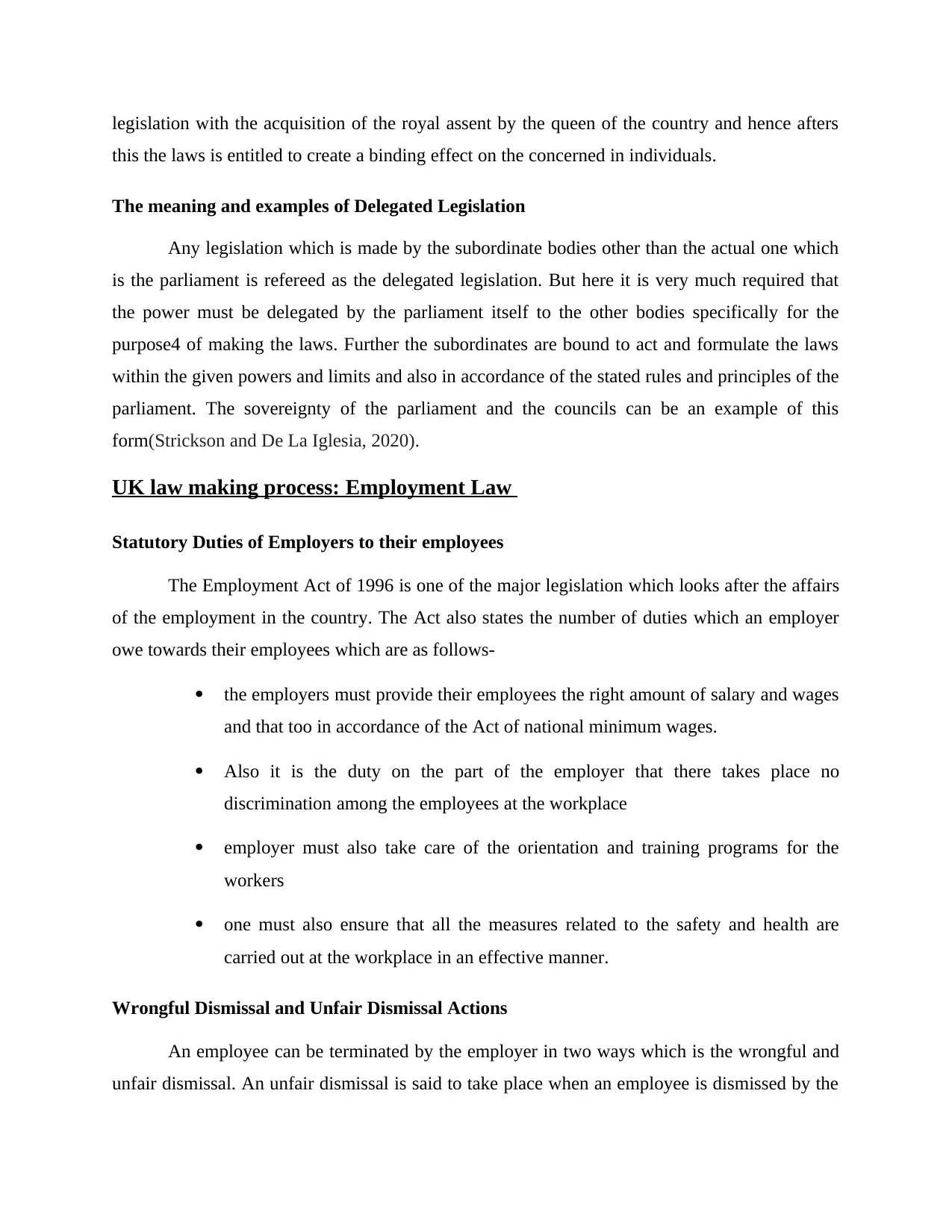
legislation with the acquisition of the royal assent by the queen of the country and hence afters
this the laws is entitled to create a binding effect on the concerned in individuals.
The meaning and examples of Delegated Legislation
Any legislation which is made by the subordinate bodies other than the actual one which
is the parliament is refereed as the delegated legislation. But here it is very much required that
the power must be delegated by the parliament itself to the other bodies specifically for the
purpose4 of making the laws. Further the subordinates are bound to act and formulate the laws
within the given powers and limits and also in accordance of the stated rules and principles of the
parliament. The sovereignty of the parliament and the councils can be an example of this
form(Strickson and De La Iglesia, 2020).
UK law making process: Employment Law
Statutory Duties of Employers to their employees
The Employment Act of 1996 is one of the major legislation which looks after the affairs
of the employment in the country. The Act also states the number of duties which an employer
owe towards their employees which are as follows-
the employers must provide their employees the right amount of salary and wages
and that too in accordance of the Act of national minimum wages.
Also it is the duty on the part of the employer that there takes place no
discrimination among the employees at the workplace
employer must also take care of the orientation and training programs for the
workers
one must also ensure that all the measures related to the safety and health are
carried out at the workplace in an effective manner.
Wrongful Dismissal and Unfair Dismissal Actions
An employee can be terminated by the employer in two ways which is the wrongful and
unfair dismissal. An unfair dismissal is said to take place when an employee is dismissed by the
this the laws is entitled to create a binding effect on the concerned in individuals.
The meaning and examples of Delegated Legislation
Any legislation which is made by the subordinate bodies other than the actual one which
is the parliament is refereed as the delegated legislation. But here it is very much required that
the power must be delegated by the parliament itself to the other bodies specifically for the
purpose4 of making the laws. Further the subordinates are bound to act and formulate the laws
within the given powers and limits and also in accordance of the stated rules and principles of the
parliament. The sovereignty of the parliament and the councils can be an example of this
form(Strickson and De La Iglesia, 2020).
UK law making process: Employment Law
Statutory Duties of Employers to their employees
The Employment Act of 1996 is one of the major legislation which looks after the affairs
of the employment in the country. The Act also states the number of duties which an employer
owe towards their employees which are as follows-
the employers must provide their employees the right amount of salary and wages
and that too in accordance of the Act of national minimum wages.
Also it is the duty on the part of the employer that there takes place no
discrimination among the employees at the workplace
employer must also take care of the orientation and training programs for the
workers
one must also ensure that all the measures related to the safety and health are
carried out at the workplace in an effective manner.
Wrongful Dismissal and Unfair Dismissal Actions
An employee can be terminated by the employer in two ways which is the wrongful and
unfair dismissal. An unfair dismissal is said to take place when an employee is dismissed by the
Paraphrase This Document
Need a fresh take? Get an instant paraphrase of this document with our AI Paraphraser
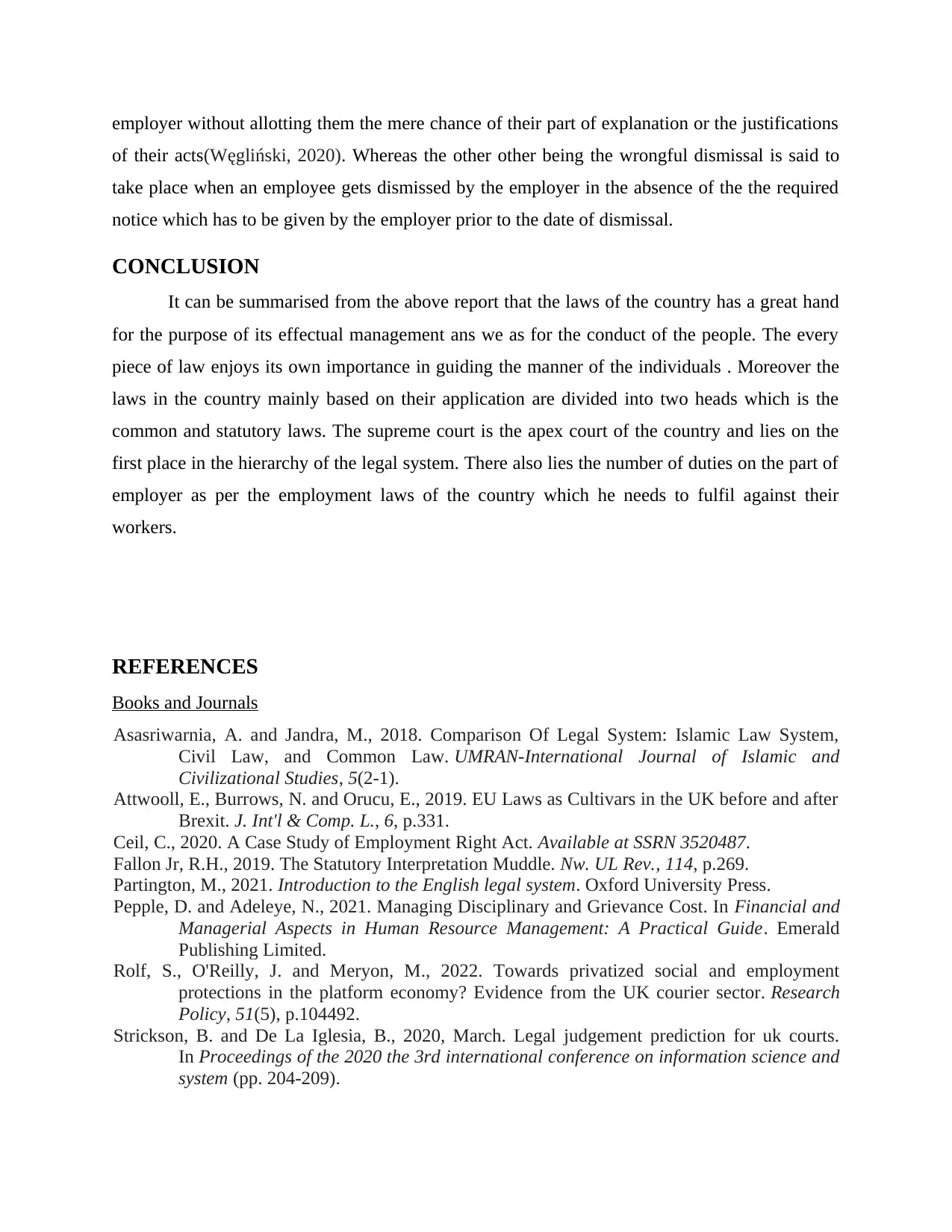
employer without allotting them the mere chance of their part of explanation or the justifications
of their acts(Węgliński, 2020). Whereas the other other being the wrongful dismissal is said to
take place when an employee gets dismissed by the employer in the absence of the the required
notice which has to be given by the employer prior to the date of dismissal.
CONCLUSION
It can be summarised from the above report that the laws of the country has a great hand
for the purpose of its effectual management ans we as for the conduct of the people. The every
piece of law enjoys its own importance in guiding the manner of the individuals . Moreover the
laws in the country mainly based on their application are divided into two heads which is the
common and statutory laws. The supreme court is the apex court of the country and lies on the
first place in the hierarchy of the legal system. There also lies the number of duties on the part of
employer as per the employment laws of the country which he needs to fulfil against their
workers.
REFERENCES
Books and Journals
Asasriwarnia, A. and Jandra, M., 2018. Comparison Of Legal System: Islamic Law System,
Civil Law, and Common Law. UMRAN-International Journal of Islamic and
Civilizational Studies, 5(2-1).
Attwooll, E., Burrows, N. and Orucu, E., 2019. EU Laws as Cultivars in the UK before and after
Brexit. J. Int'l & Comp. L., 6, p.331.
Ceil, C., 2020. A Case Study of Employment Right Act. Available at SSRN 3520487.
Fallon Jr, R.H., 2019. The Statutory Interpretation Muddle. Nw. UL Rev., 114, p.269.
Partington, M., 2021. Introduction to the English legal system. Oxford University Press.
Pepple, D. and Adeleye, N., 2021. Managing Disciplinary and Grievance Cost. In Financial and
Managerial Aspects in Human Resource Management: A Practical Guide. Emerald
Publishing Limited.
Rolf, S., O'Reilly, J. and Meryon, M., 2022. Towards privatized social and employment
protections in the platform economy? Evidence from the UK courier sector. Research
Policy, 51(5), p.104492.
Strickson, B. and De La Iglesia, B., 2020, March. Legal judgement prediction for uk courts.
In Proceedings of the 2020 the 3rd international conference on information science and
system (pp. 204-209).
of their acts(Węgliński, 2020). Whereas the other other being the wrongful dismissal is said to
take place when an employee gets dismissed by the employer in the absence of the the required
notice which has to be given by the employer prior to the date of dismissal.
CONCLUSION
It can be summarised from the above report that the laws of the country has a great hand
for the purpose of its effectual management ans we as for the conduct of the people. The every
piece of law enjoys its own importance in guiding the manner of the individuals . Moreover the
laws in the country mainly based on their application are divided into two heads which is the
common and statutory laws. The supreme court is the apex court of the country and lies on the
first place in the hierarchy of the legal system. There also lies the number of duties on the part of
employer as per the employment laws of the country which he needs to fulfil against their
workers.
REFERENCES
Books and Journals
Asasriwarnia, A. and Jandra, M., 2018. Comparison Of Legal System: Islamic Law System,
Civil Law, and Common Law. UMRAN-International Journal of Islamic and
Civilizational Studies, 5(2-1).
Attwooll, E., Burrows, N. and Orucu, E., 2019. EU Laws as Cultivars in the UK before and after
Brexit. J. Int'l & Comp. L., 6, p.331.
Ceil, C., 2020. A Case Study of Employment Right Act. Available at SSRN 3520487.
Fallon Jr, R.H., 2019. The Statutory Interpretation Muddle. Nw. UL Rev., 114, p.269.
Partington, M., 2021. Introduction to the English legal system. Oxford University Press.
Pepple, D. and Adeleye, N., 2021. Managing Disciplinary and Grievance Cost. In Financial and
Managerial Aspects in Human Resource Management: A Practical Guide. Emerald
Publishing Limited.
Rolf, S., O'Reilly, J. and Meryon, M., 2022. Towards privatized social and employment
protections in the platform economy? Evidence from the UK courier sector. Research
Policy, 51(5), p.104492.
Strickson, B. and De La Iglesia, B., 2020, March. Legal judgement prediction for uk courts.
In Proceedings of the 2020 the 3rd international conference on information science and
system (pp. 204-209).

Węgliński, C., 2020. DISTINGUISHING IN STATUTORY LAW: THE STATUTE AS
WRITTEN CUSTOM UNDER MAURICE HAURIOU’S LEGAL
INSTITUTIONALISM. Revija za pravnu, političku i socijalnu teoriju i filozofiju, 4.
WRITTEN CUSTOM UNDER MAURICE HAURIOU’S LEGAL
INSTITUTIONALISM. Revija za pravnu, političku i socijalnu teoriju i filozofiju, 4.
⊘ This is a preview!⊘
Do you want full access?
Subscribe today to unlock all pages.

Trusted by 1+ million students worldwide
1 out of 9
Related Documents
Your All-in-One AI-Powered Toolkit for Academic Success.
+13062052269
info@desklib.com
Available 24*7 on WhatsApp / Email
![[object Object]](/_next/static/media/star-bottom.7253800d.svg)
Unlock your academic potential
Copyright © 2020–2025 A2Z Services. All Rights Reserved. Developed and managed by ZUCOL.


